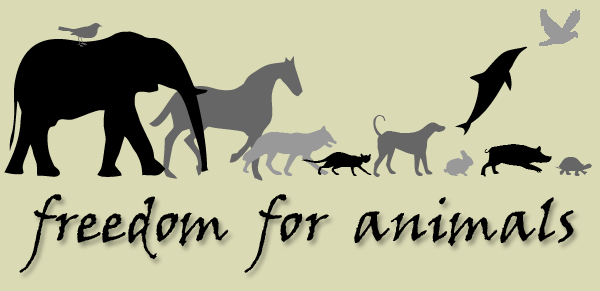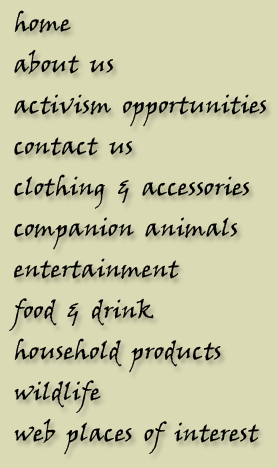

|
Meat is murder. If that sounds like a wild statement, read on. If you want more proof of the delicious benefits of a vegetarian or vegan diet, check out these links:
Need proof of the horror that animals raised for food endure?
If Slaughterhouses Had Glass Walls FOOD FAQ: Some common questions asked and statements made by non-vegetarians, accompanied by common-sense answers/responses. Q.
"What is a vegetarian? And what is a vegan? Are they the same
thing?"
A. A vegetarian is someone who doesn't eat any meat. They don't eat fish, chicken, pork, beef, or any other kind of animal flesh. They may eat eggs and dairy products. Vegans do not eat any animal product, and they don't eat any eggs, dairy products, or any food containing ingredients derived from animals. Q. If you don't eat meat, what do you eat?" A. This is an understandable question, as the companies who produce grain (all but 2% of which is fed to animals slaughtered for food, and NOT fed to humans) and those who produce meat and dairy products want you to believe that there is no such thing as a delicious or nutritious meat-and-animal-free diet. They're lying to you. Meat is NOT what's for dinner, and the answer to "Got milk?" should be "Heck NO!". Need proof? Read on for the answer to the another frequently-asked question from non-vegetarians: Q. "Don't humans need meat to be healthy?" A.
NO. Humans who don't eat meat are much healthier than
those who do. Humans are NOT carnivores; we're omnivores, meaning
we eat a variety of foods, such as vegetables, fruits, nuts, and
grains. Carnivores (like lions and tigers) eat nothing but meat.
Q. "What about milk? I love it and it's good for everyone, especially children." A.
Milk is NOT good for you. The high numbers of humans who are lactose
intolerant tells us that we are not meant to drink milk or eat
cheese, and that our mothers' breast "milk" is as much
dairy as we're supposed to have. Even those of us who can digest
dairy products with no problem are still getting way too much
fat, cholesterol, and calories from milk. Q. "Meat alternatives don't taste good and they're hard to find. And they're more expensive than meat!" A. Wrong, wrong, and WRONG. Meat alternatives (soy, textured vegetable protein, and beans) are delicious, and you can find them in any grocery store or market. Meat is much more expensive, both directly (in terms of the price you pay in the store) and indirectly (in terms of the costs of medical care for the diseases caused by its consumption). Visit GoVeg.com for great meal ideas, and subscribe to Vegetarian Times, an entire magazine devoted to delicious, healthy, vegetarian fare. Q. "I'm a Christian, and I believe God gave us the animals to use for food and clothing. Not to eat meat is a sin." A.
And you think God would approve of how humans treat animals
on factory farms, in testing labs, zoos, and circuses? The Bible
says that man was given "dominion" over the beasts --
but that doesn't mean eating them, and it surely doesn't mean
torturing them.
|
|
| home
| about us | activism
| contact us | clothing
& accessories | companion animals
| entertainment food & drink | household products | wildlife | web places of interest |
||
©2015 Freedom for Animals |
||